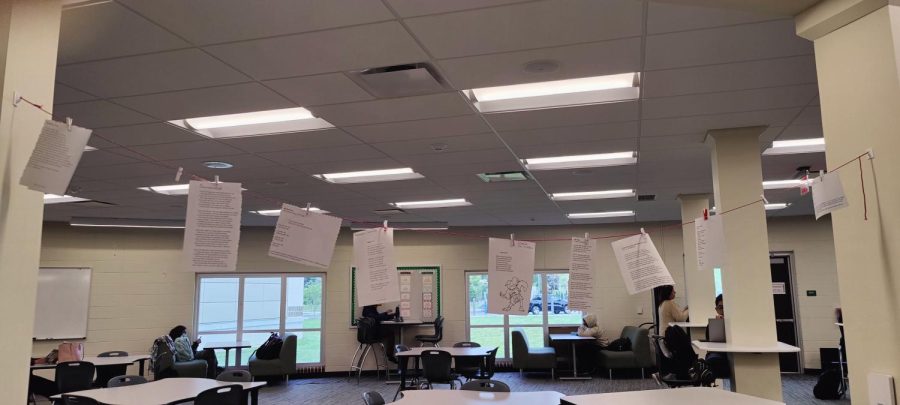Poem in your pocket, Poetry in your mind
Poems selected by students are on display in the Media Center in celebration of National Poetry Month.
May 30, 2023
When people are asked to name an example of short-form literature, they usually say short stories or small excerpts from a longer piece of literature. Poetry doesn’t even come to mind.
Yet, as School Librarian, Ms. Mary Desmond said, “I feel like poetry is a great way to connect with people and to be able to express yourself without having to feel like you have to be this very prolific writer who can just write, pages and pages.”
Ms. Desmond added “Poem in Your Pocket Day” to the activities held in the Media Center during April, National Poetry Month.
According to Poets.org, “Poem in Your Pocket Day” began in 2002 by the Mayor’s Office of New York City. Since last year, this day has become an annual celebration at South. Pirates are encouraged to carry a poem in their pocket throughout the day and share it with others. They are also encouraged to use their poem as a piece of inspiration for their day.
In addition to the Media Center’s celebration of National Poetry Month, Echoes, South’s literary and arts magazine, also celebrated Poetry Month. Students are a significant part of planning these National Poetry Month celebrations, which includes Open Mic among other events. “Last year was very similar to this year,”said Dr. Danielle Bugge. “Amira [Adarkwah (‘22)], [the] editor in chief [of Echoes], took charge of the entire event. And she held the workshops leading up to the Open Mic.”
During the Open Mic, students and teachers read a poem of their choice. This year it took place on Bring Your Child to Work Day, some of the teachers’ children also participated in the Open Mic. These events are beneficial in helping Echoes’s efforts to bring more awareness to the poetic form.
“When [students] think of art, they don’t think of poems. The first thing to think of is like actual art with paint,” said Echoes member Rujula Mahajan (‘24). “And then there’s literary art, which is essays and stories and books.”
Language Arts teacher Ms. Tyler Barnes said, “I don’t think [poetry] has gotten the recognition it deserves because a lot of people find it intimidating to read, write, or analyze.” Ms.Barnes finds that due to the unfamiliarity with poetry, students find poetry to be too complex.
Indeed poetry could be quite an intimidating form of literature, but if one takes the time to admire this form of art, one can realize the beauty in poetry and its ability to capture moments with precision and perfection. Mahajan said that in poetry, “[You] can write a whole story in just a [few] sentences and they [can] have such a deep impact.”

